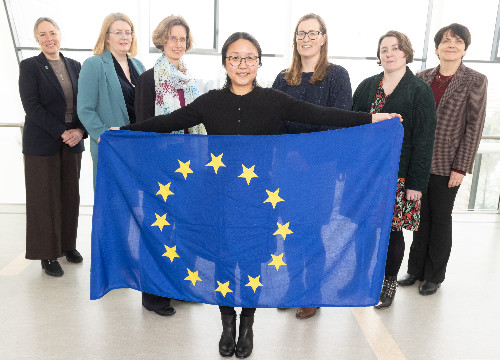 Horizon Europe is the EU's research and innovation programme for 2021-2027 with a budget of €95.5 billion. It tackles climate change, helps to achieve the UN’s Sustainable Development Goals and boosts the EU’s competitiveness and growth.
Horizon Europe is the EU's research and innovation programme for 2021-2027 with a budget of €95.5 billion. It tackles climate change, helps to achieve the UN’s Sustainable Development Goals and boosts the EU’s competitiveness and growth.
The programme facilitates collaboration and strengthens the impact of research and innovation in developing, supporting and implementing EU policies while tackling global challenges. It supports creating and better dispersing of excellent knowledge and technologies.
UCD is the national leader in EU-funded research and hosts numerous largescale consortium projects coordinated by world-class academics at the university. Many of these are funded under Pillar 2 of the framework, addressing global challenges and European industrial competitiveness under six clusters. Some of UCD’s Horizon Europe coordinator projects include:
Cluster 1: Health
Validating AI in Classifying Cancer in Real-Time Surgery (CLASSICA), coordinated by Professor Ronan Cahill, UCD School of Medicine
Cluster 2: Culture, Creativity, and Inclusive Society
Fostering Queer Feminist Intersectional Resistances against Transnational Anti-Gender Politics (RESIST), coordinated by Professor Kath Browne, UCD School of Geography
From one closed door to another: Cumulative discrimination and prejudice against marginalised groups in Europe (EQUALSTRENGTH), coordinated by Associate Professor Mathew Creighton, UCD School of Sociology
From Housing Inequality to Sustainable, Inclusive and Affordable Housing Solutions, (EQUALHOUSE), Professor Michelle Norris, coordinated by UCD School of Social Policy Social Work and Social Justice
Forging Successful AI Applications for European Economy and Society (FORSEE), coordinated by Dr Elizabeth Farries, UCD School of Information and Communication Studies (pictured above)
Cluster 4: Digital, Industry and Space
Development of a multifunctional biomaterial patch for buccal delivery of peptide-analogue treatments (BUCCAL-PEP), coordinated by Professor David Brayden, UCD School of Veterinary Medicine
Cluster 5: Climate, Energy and Mobility
Transport Research Arena 2024: Dublin (TRA2024), coordinated by Dr Ciaran McNally, UCD School of Civil Engineering
Smart Enforcement of Transport Operations (SETO), coordinated by Dr Beatriz Martinez-Pastor, UCD School of Civil Engineering
Exploring the synergies between direct carbon-capture, nutrient recovery and next-generation purification technologies for cost-competitive and sustainable microalgal aviation fuel (SusAlgaeFuel), coordinated by Dr Ronald Halim, UCD School of Biosystems and Food Engineering
Cluster 6: Food, Bioeconomy, Natural Resources, Agriculture and Environment
Education for the BioEconomy (BioBeo), coordinated by Associate Professor Tom Curran, UCD School of Biosystems and Food Engineering
A holistic framework with anticounterfeit and intelligence-based technologies that will assist food chain stakeholders in rapidly identifying and preventing the spread of fraudulent practices (WATSON), coordinated by Dr Dimitrios Argyropoulos, UCD School of Biosystems and Food Engineering
TransformDairyNet: Working together to upscale Cow-Calf-Contact dairy production and beyond (TRANSFORMDAIRYNET) coordinated by Dr Siobhan Mullan, UCD School of Veterinary Medicine
Nature-3B: Including Nature in decision making of central Banks, investment Benchmarks & Bond issuers (Nature-3B), coordinated by Professor Andreas Hoepner, UCD Smurfit School of Business
European Food Fraud Community of Practice: From Outset to Operation (EffCop), coordinated by Professor Saskia van Ruth, UCD School of Agriculture and Food Science
Joint Research and EU Missions
Rethinking the design of streets and public spaces to leverage the modal shift to climate-friendly active transport everywhere (REALLOCATE), funded under the EU Mission for Climate-Neutral and Smart Cities, coordinated by Professor Francesco Pilla, UCD School of Architecture Planning and Environmental Policy
A new European blueprint for circular bioplastics upcycling solutions (ReBioCycle), a Joint-Undertaking (research-industry) for Circular Biobased Economy, coordinated by Professor Kevin O'Connor, UCD School of Biomolecular and Biomedical Science
Networks for Training and Exchange: Marie Sklodowska-Curie Actions
 Pillar 1 is the framework’s ‘Excellence’ strand, which reinforces and extends the excellence of the EU’s science and knowledge base. This includes the European Research Council (visit UCD’s ERC Showcase), Research Infrastructures, and the Marie Sklodowska-Curie Actions (MSCA) programmes which equip researchers with new knowledge and skills through mobility and training. UCD hosts several prestigious MSCA Doctoral Networks, including:
Pillar 1 is the framework’s ‘Excellence’ strand, which reinforces and extends the excellence of the EU’s science and knowledge base. This includes the European Research Council (visit UCD’s ERC Showcase), Research Infrastructures, and the Marie Sklodowska-Curie Actions (MSCA) programmes which equip researchers with new knowledge and skills through mobility and training. UCD hosts several prestigious MSCA Doctoral Networks, including:
Smart Mechatronic Ankle-Foot Orthosis Platform for Gait Assistance and Augmentation (SmartANKLE), coordinated by Associate Professor Giacomo Severini, UCD School of Electrical and Electronic Engineering
European Network in Coding Theory (ENCODE), coordinated by Associate Professor Eimear Byrne, UCD School of Mathematics and Statistics
Intelligent circular lifecycles of industrial robots outdoor power products and electric vehicles (iCircular3), coordinated by Associate Professor Nikolaos Papakostas, UCD School of Mechanical and Materials Engineering
Root Phenotyping Integrated Educational Doctoral Network (RootEd), coordinated by Dr Saoirse Tracy, UCD School of Agriculture and Food Science
C-NEWTRAL: Smart comprehensive training to mainstream new approaches for climate-neutral cities through citizen engagement and decision-making support for innovative governance and integrated planning, coordinated by Dr Aura Istrate, UCD School of Architecture Planning and Environmental Policy
Consumer Demand Flexibility in Electricity Use (Codef), coordinated by Professor Lisa Ryan, UCD School of Economics